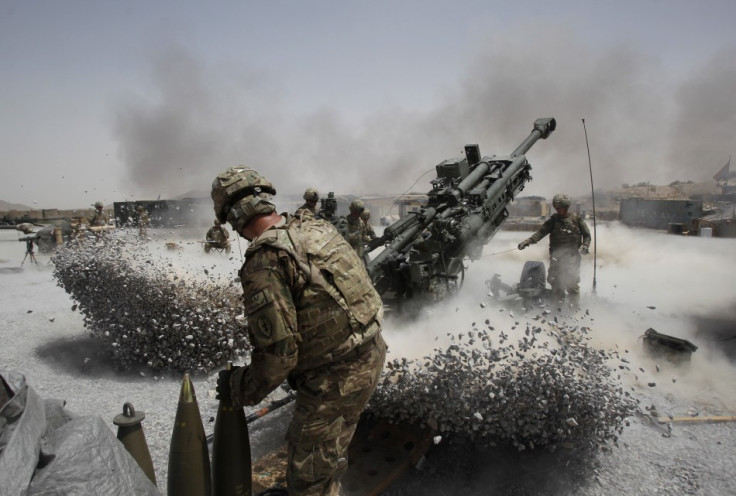9/11 and War on Terror: Act of Justice or Act of Vengeance Reflecting the U.S. Cold War Mentality?

Ten years after 9/11 many analysts still insist the U.S. response to the attacks by waging a war on terror and invading Iraq and Afghanistan is yet another illustration of the country's struggle to operate outside of the cold war mentality which saw it become the hegemon.
In a world where non state actors have gradually become more prominent and influential, with more calling for more balance of power and denouncing ideological imperialism, the aftermath of 9/11 and the subsequent war on terror have become one of the most politicised issues of the last 10 years. With supporters and protesters alike the debate surrounding the issue has also largely surrounded the reason why 9/11 happened or what were the U.S. interests in invading both Iraq and Afghanistan and drafting its own axis of evil list.
Looking back at history however helps us understand how and why the U.S. first became involved with the Taliban/mujahedeen during the cold war period, training and financing them.
During the 1970s and early 1980s Afghanistan struggled to be independent of foreign influence and was faced with soviet imperialism.
The USSR, on the other hand justified the invasion of Afghanistan in 1979 by insisting that as a client state, Afghanistan should not leave the soviet sphere of influence. As the struggle between the two lasted, the U.S. saw an an opportunity to get back at its Cold War rival after the humiliating defeat in Indochina in 1975, which was defended by a PR campaign insisting Washington could not turn a blind eye on an outright invasion by a global power of a small nation.
Clearly, despite wars of decolonisation and violent insurgencies throughout Africa the U.S. did not pre-empt the effect and ramifications financing and training the Afghan mujahedeen would have.
What the mujahedeen turned Taliban, ultimately led by Osama Bin Laden realised however is that provoking the United States into small but painfully long wars would affect its economy and help disseminate anti-American feeling in the Arab world but also in south Asian in countries like Afghanistan and Pakistan.
Bin Laden, many analysts insist, was set on tricking the U.S. into using its military resources, knowing the country would respond to a terrorist attack the same way it would respond to any other enemies: by launching the war machine.
"He repeatedly asserted that the only way to drive the U.S. from the Muslim world and defeat its satraps was by drawing Americans into a series of small but expensive wars that would ultimately bankrupt them," Eric Margolis writes. "'Bleeding the US,' in his words. The United States, first under George W. Bush and then Barack Obama, rushed right into bin Laden's trap ... Grotesquely overblown military outlays and debt addiction ... may be the most pernicious legacy of the man who thought he could defeat the United States."
With the recession now hitting the country hard, some of the money spent in the war against terror could also have been used in the development of social programs or public education.
Margils also cites a French Minister as saying at the time, "that a massive assault on a Muslim population would be the answer to the prayers of bin Laden and his associates."
Others also point out that the death of Bin Laden is still an expression of the cold war mentality with the U.S. using means which are highly contestable from an international law point of view to hunt down its enemy. Bin Laden was killed in Abbottabad in May 2011 during a raid by U.S. Navy seals. However as details of the raid started to emerge, it was clear the initial mission was to kill not capture Bin Laden. Living in a virtually unprotected compound, an unarmed Bin Laden was unarmed but shot twice while his wife, also unarmed, was also killed. The disposal of the body without autopsy was also criticised by allies and from a legal point of view as British barrister Geoffrey Robertson, who supported the intervention but opposed the execution explains "Pakistan law requires a colonial inquest on violent death, and international human rights law insists that the 'right to life' mandates an inquiry whenever violent death occurs from government or police action. The U.S. is therefore under a duty to hold an inquiry that will satisfy the world as to the true circumstances of this killing."
Since then other al-Qaeda operatives have been killed by the U.S. which is quite interesting viewed in analogy with the tactics held by the Bush administration.
After 9/11, George W Bush vowed to get those responsible for the attacks and throughout the years many al-Qaeda members were arrested and put into custody. While the use of Guantanamo remains questionable and some of the tactics employed difficult to accept, an effort was nonetheless made to arrest not just kill the suspects. The Obama administration however seems to have adopted a more direct policy approach.
In this sense the bin Laden assassination could be seen as more like an act of vengeance, which reflects the remnants of a cold war mentality rather than an act of justice, as the legal option of a trial seems to have been almost immediately rejected.
© Copyright IBTimes 2025. All rights reserved.





















